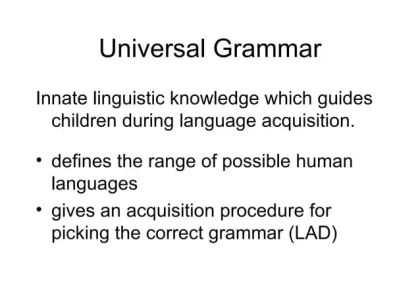Noam Chomsky, (born Dec. 7, 1928, Philadelphia, Pa., U.S.), U.S. linguist, philosopher, and political activist. He received a Ph.D. in linguistics from the University of Pennsylvania in 1955, the same year he joined the faculty at the Massachusetts Institute of Technology (MIT). Chomsky takes the proper object of study for → linguistics to be the mentally represented grammars that constitute the native speaker’s knowledge of his language and the biologically innate language faculty, or “universal grammar,” that enables the developmentally normal language learner, as a child, to construct a grammar of the language to which he is exposed. For Chomsky, the ultimate goal of linguistic science is to develop a theory of universal grammar that provides a descriptively adequate grammar for any natural language given only the kind of “primary linguistic data” available in the social environments of children. This imperative has motivated the gradual refinement of → Chomskyan linguistic theory from the early transformational grammar of the 1950s and ’60s to the Minimalist Program of the 1990s and beyond. A self-described libertarian socialist, Chomsky has written numerous books and lectured widely on what he considers the antidemocratic character of American capitalism and its pernicious influence on the country’s politics and foreign policy, mass media, and academic and intellectual culture. → generative grammar.
The basis of Chomsky’s linguistic theory lies in → biolinguistics, the linguistic school that holds that the principles underpinning the → structure of language are biologically preset in the human mind and hence genetically inherited. He argues that all humans share the same underlying linguistic structure, irrespective of sociocultural differences. In adopting this position Chomsky rejects the radical behaviorist psychology of B. F. Skinner, who viewed speech, thought, and all behavior as a completely learned product of the interactions between organisms and their environments. Accordingly, Chomsky argues that language is a unique evolutionary development of the human species and distinguished from modes of communication used by any other animal species. Chomsky argues that his nativist, internalist view of language is consistent with the philosophical school of “rationalism” and contrasts with the anti-nativist, externalist view of language consistent with the philosophical school of “empiricism”, which contends that all knowledge, including language, comes from external stimuli. Historians have disputed Chomsky’s claim about rationalism on the basis that his theory of innate grammar excludes propositional knowledge and instead focuses on innate learning capacities or structures.
Chomsky has maintained (→ universal grammar) that syntactic knowledge is at least partially inborn, implying that children need only learn certain language-specific features of their native languages. He bases his argument on observations about human language acquisition and describes a “poverty of the stimulus”: an enormous gap between the linguistic stimuli to which children are exposed and the rich linguistic competence they attain.
Chomsky is widely recognized as having helped to spark the → cognitive revolution in the human sciences, contributing to the development of a new → cognitivistic framework for the study of → language and the mind.


